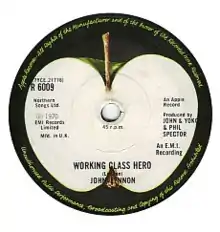Working Class Hero
"Working Class Hero" is a song by John Lennon from his 1970 album John Lennon/Plastic Ono Band, his first album after the break-up of the rock band the Beatles.
| "Working Class Hero" | ||||
|---|---|---|---|---|
 | ||||
| Single by John Lennon | ||||
| from the album John Lennon/Plastic Ono Band | ||||
| A-side | "Imagine" | |||
| Released | 11 December 1970 (album) 24 October 1975 (single) | |||
| Recorded | 26 September – 9 October 1970 | |||
| Genre | Folk | |||
| Length | 3:48 | |||
| Label | Apple | |||
| Songwriter(s) | John Lennon | |||
| Producer(s) |
| |||
| John Lennon US singles chronology | ||||
| ||||
| John Lennon UK singles chronology | ||||
| ||||
| John Lennon/Plastic Ono Band track listing | ||||
11 tracks
| ||||
Theme
Stridently political,[1] the song is a commentary/criticism on the difference between social classes. According to Lennon in an interview with Jann Wenner of Rolling Stone in December 1970, it is about working class individuals being processed into the middle classes, into the "machine".[2] Lennon also said, "I think it's a revolutionary song – it's really just revolutionary. I just think its concept is revolutionary. I hope it's for workers and not for tarts and fags. I hope it's about what Give Peace a Chance was about. But I don't know – on the other hand, it might just be ignored. I think it's for the people like me who are working class, who are supposed to be processed into the middle classes, or into the machinery. It's my experience, and I hope it's just a warning to people, Working Class Hero."[3]
The refrain of the song is "A working class hero is something to be".
The song was not Lennon's first political song. His string of political songs began in 1968 with the Beatles' "Revolution" and further continued in 1972 with the release of Some Time in New York City.[1]
Recording and sound
Recorded at EMI Studios on 27 September 1970,[4] the song features only Lennon, singing and playing an acoustic guitar as his backing. The chord progression is very simple, and builds on A-minor and G-major, with a short detour to D-major in one line of the chorus. Lennon's strumming technique includes a riff with a hammer-on pick of the E note on the D string and then an open A string.[5] The tone and style of the song is similar to that of "Masters of War" and "North Country Blues" by Bob Dylan, a known influence of Lennon. Both are based on Jean Ritchie's arrangement of the traditional English folk song, "Nottamun Town". Lennon recorded "Working Class Hero" over a hundred times until he was satisfied with the recording.[1] The recording is the composite of two different takes: the tone of the guitar and vocal changes between 1:24 and 1:45 for the verse "When they've tortured and scared you".
Personnel
- John Lennon – vocals, acoustic guitar
Controversy
In 1973,[6] US Representative Harley Orrin Staggers heard the song – which includes the lines "'Til you're so fucking crazy you can't follow their rules" and "But you're still fucking peasants as far as I can see" – on WGTB and lodged a complaint with the Federal Communications Commission (FCC). The manager of the station, Ken Sleeman, faced a year in prison and a $10,000 fine, but defended his decision to play the song saying, "The People of Washington DC are sophisticated enough to accept the occasional four-letter word in context, and not become sexually aroused, offended, or upset." The charges were dropped.[7] Other US radio stations, like Boston's WBCN, banned the song for its use of the word "fucking".[8] In Australia, the album was released with the expletive removed from the song and the lyrics censored on the inner sleeve.[9]
Notable covers
- Marianne Faithfull covered the song on her 1979 album Broken English.
- David Bowie's band Tin Machine recorded a version of the song on their 1989 self-titled debut album.
- Marilyn Manson's cover of the song was released on his Disposable Teens single of 2000.
- Green Day contributed a cover of the song to the Instant Karma: The Amnesty International Campaign to Save Darfur in 2007.
- The similarly titled single by Tommy Roe (#79 Canada June 1973/#29 AC) is not the same song.
- Ozzy Osbourne covered the song on his 2005 album Under Cover.
References
- "Working Class Hero". The Beatles Bible. 2 August 2010. Retrieved 20 July 2017.
- Wenner, Jann (December 1970). "John Lennon interview". Rolling Stone. New York City: Wenner Media LLC. Retrieved 8 May 2009.
- "John Lennon's Song: Working Class Hero". The Beatles Bible. Retrieved 21 March 2020.
- Madinger, Chip; Raile, Scott (2015). LENNONOLOGY Strange Days Indeed – A Scrapbook of Madness. Chesterfield, MO: Open Your Books, LLC. p. 210. ISBN 978-1-63110-175-5.
- Lennon, John (1983). Lennon: The Solo Years. Hal Leonard Publishing Corporation. p. 156. ISBN 0-88188-249-6.
- Raz, Guy (29 January 1999). "Radio Free Georgetown". Washington City Paper. Archived from the original on 9 December 2012. Retrieved 31 March 2009.
- Blecha, Peter (2004). Taboo Tunes: A History of Banned Bands & Censored Songs. Backbeat Books. pp. 160–161. ISBN 0-87930-792-7.
- Schechter, Danny (1997). The More You Watch, the Less You Know: News Wars/Submerged Hopes/Media Adventures. Seven Stories Press. p. 106. ISBN 1-888363-80-0.
- Blaney, John (2005). John Lennon: Listen To This Book. Paper Jukebox. p. 59. ISBN 0-9544528-1-X.